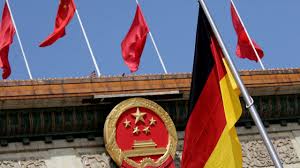
Headline shares of the Mainland China equity market tumbled on Monday, 10 December 2018, as risk -off selloff triggered amid signs domestic economy remains under pressure after weaker-than-expected Chinese trade data and a potential escalation of tensions with Washington. In afternoon trade, the benchmark Shanghai Composite Index was down 0.9%, or 23.67 points, to 2,582.22, meanwhile the Shenzhen Composite Index, which tracks stocks on China's second exchange, fell 1.24%, or 16.78 points, to 1,333.92. The blue-chip CSI300 index was down 1.23%, or 39.22 points, to 3,14234.
China suffered another economic blow on Sunday with the return of the deflation threat, a day after it reported slower than expected growth in exports and imports. A fall in both consumer and producer price indexes was a result of weakness in demand from both Chinese consumers and investors and reflected their reluctance to spend as confidence in future growth is undermined by the trade war with the US. The figures add the challenge faced by the Chinese leadership in keeping economic growth on track ahead of the annual central economic work conference, where policies for next year will be determined.
The consumer price index fell 0.3% in November 2018 from October 2018 while the producer price index dropped 0.2% - the first month-on-month fall in seven months - due to the steep fall in the price of crude oil and coal, according to data released by the National Bureau of Statistics on Sunday. On a yearly basis, China's PPI rose only 2.7% in November, the lowest reading in two years, while China's CPI in November rose 2.2% from a year earlier, the lowest in four months, the official statistics showed.
The return of deflation risks, which often associated with a contraction in economic activities, provides fresh evidence that China's US$12 trillion economy is heading into trouble, even though China and US have agreed a 90-day truce in the trade war during which they will try to resolve their differences.
The official purchasing managers index, a leading indicator of economic growth, showed activity in China's vast manufacturing sector stalled in November for the first time in over two years as new orders shrank. The country's exports decelerated rapidly last month, although China's trade surplus with the US widened to a record level, the Chinese customs administration said on Saturday. China's economic growth also slowed to 6.5% in the third quarter of this year from 6.7% in the second quarter of this year.
NEWS FROM THE PRESS: China summons Canadian Ambassador over HUAWEI detention -Vice Foreign Minister Le Yucheng urgently summoned Canadian Ambassador to China John McCallum on Saturday to lodge solemn representations and strongly protest the “unreasonable” detention of Meng Wanzhou, the chief financial officer for tech giant Huawei, by the Canadian authorities, the Foreign Ministry said in a statement. Le said the detention of Meng, who was transferring flights in Vancouver, Canada, at the request of the United States is a severe violation of her legitimate rights and interests. “Such a move ignores the law and is unreasonable, unconscionable and vile in nature,” said Le in the statement. China strongly urges the Canadian side to immediately release Meng and effectively protect her legitimate rights and interests, or face grave consequences that the Canadian side should be held accountable for, Le said. It was the third response from the ministry since Thursday when the news about Meng's detention came out. Meng, 46, was detained while she was changing planes in Vancouver on Dec. 1.
Forex reserves rise as yuan posts rare gain - China's foreign exchange reserves unexpectedly rose in November for the first time in four months as the yuan posted a rare gain amid signs of a thaw in trade tensions between the United States and China. China's reserves, the world's largest, rose by US$9 billion in November to US$3.062 trillion, central bank said Friday. That marked the first increase since July and compared with a drop of US$33.93 billion in October, which raised concerns that the central bank was having to intervene more frequently in markets to support the faltering yuan currency. The gain in November was due to changes in global currency rates and asset prices, according to China's State Administration of Foreign Exchange, adding it expected reserve levels to remain stable despite market fluctuations.
S&P Dow Jones to add A shares to its indexes - Global equity index provider S&P Dow Jones Indices will include A shares in its global benchmarks next year, the company said, becoming the latest in a string of index providers to include Chinese mainland shares in their major indexes. S&P Dow Jones Indices will add “eligible China A shares” tradeable through the northbound channel of the Shanghai-Hong Kong and Shenzhen-Hong Kong stock connect facilities to its Global Benchmark Indices on Sept. 23, 2019, the company said in a statement last week. The shares will be included “using a reduced weight factor of 25% of each company's investable weight factor,” according to the statement. China has stepped up opening up of its financial markets this year to offset the impact a bruising trade war with the United States. Capital drawn into China through broader index inclusion could help stabilize its wobbly stock market and reduce pressure on the yuan. By the end of November, the market value of shares traded via the Shanghai-Hong Kong and the Shenzhen-Hong Kong stock connect programs reached 678.7 billion yuan (US$98.3 billion), up 57.9 billion yuan from a month ago
CURRENCY NEWS: China yuan weakened against greenback on Monday, after central bank set softer mid-point rate. Prior to market opening, the People Bank of China set the yuan reference rate at 6.8693 vs Friday's fix of 6.8664. In China's spot foreign exchange market, the yuan is allowed to rise or fall by 2% from the central parity rate each trading day.
0 thoughts on “China Stocks drop on deflation threat trade wary”